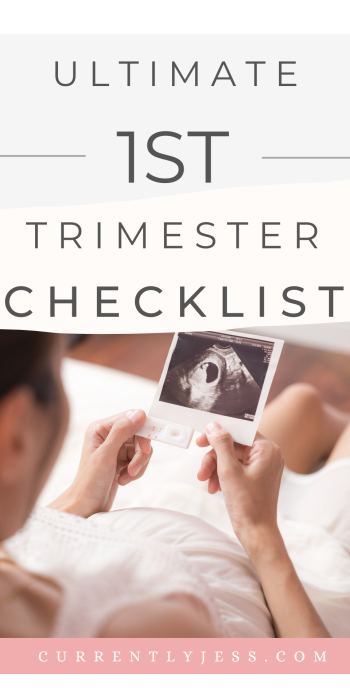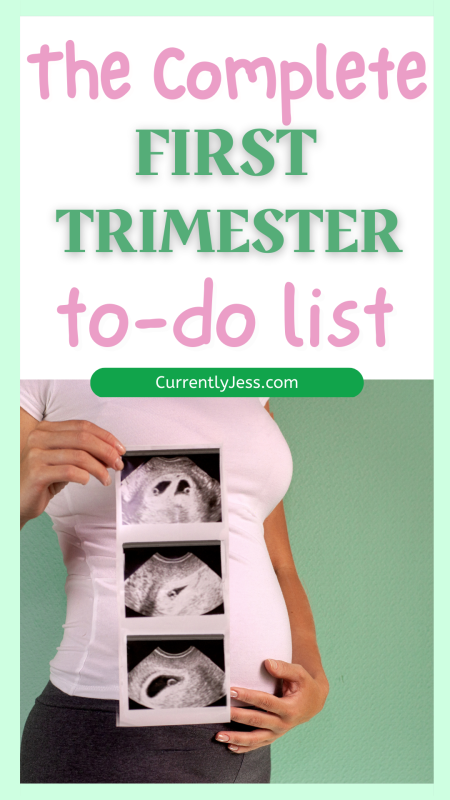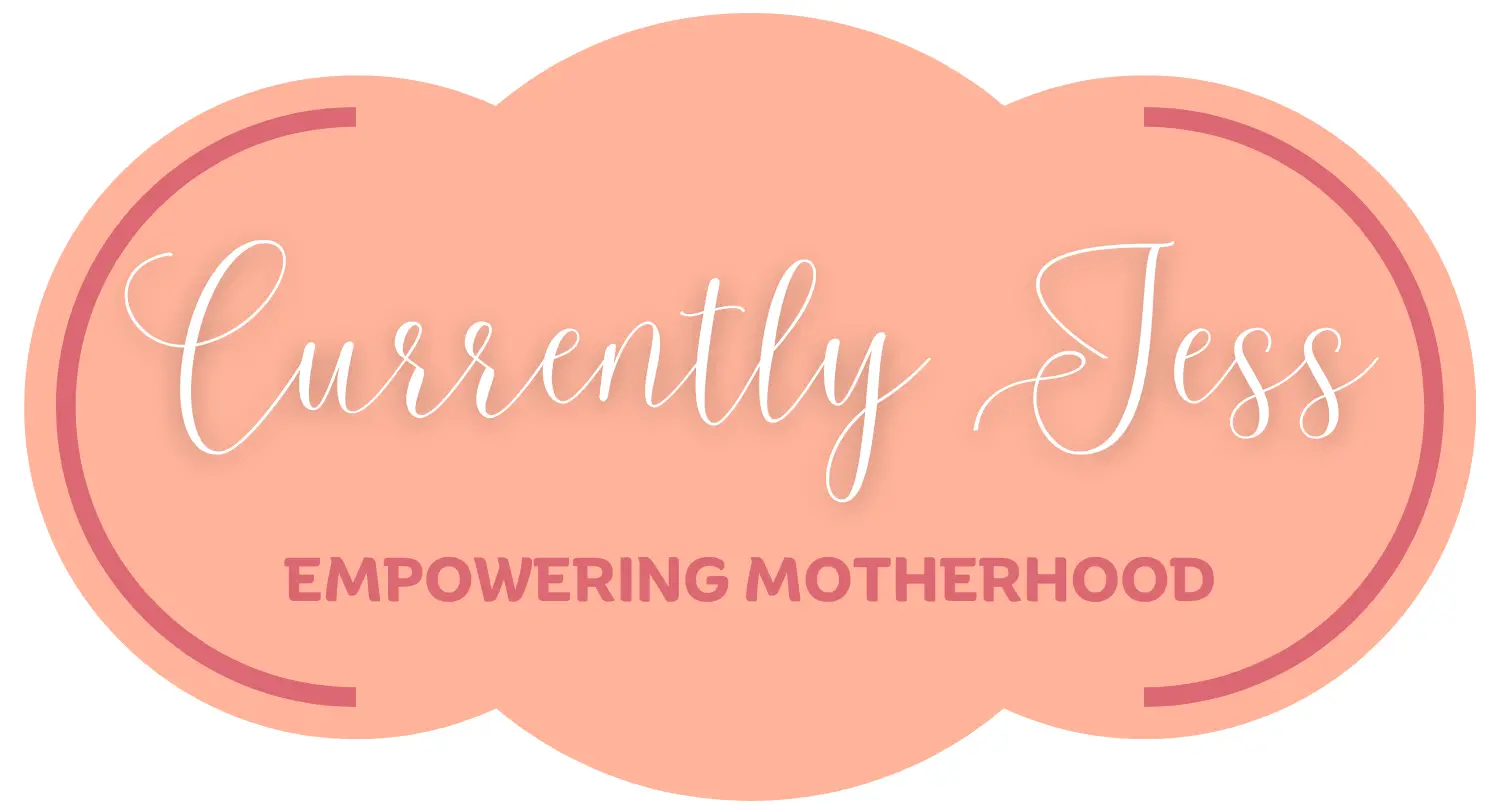Last updated on July 9th, 2024 at 02:00 pm
Congrats on your pregnancy, mama! Whether this is your first or you have a few little ones already, this is such an exciting time. You are probably feeling so many emotions and it is easy to get overwhelmed in your first trimester of pregnancy. Your life is changing in such an exciting way!
I know for me after the initial shock wore off, I felt overwhelmed and really didn’t know where to begin to prepare for my new baby. Compiling a list of all the things I needed, especially at the beginning, helped put my mind at ease.
Here is my list of everything you’ll need to prepare or start thinking about while still in your first trimester of pregnancy.
Let’s get started!
Disclaimer: This post may contain affiliate links. If purchases are made through these links, I may receive a small commission at no additional cost to you. Thank you for supporting this site.
1. Have Your First Prenatal Check Up
One of the first things you should do after your positive pregnancy test is set up your first prenatal appointment with a doctor. When you call it is likely your appointment won’t be for several weeks out. Don’t panic! Its normal for providers to wait to see you until you are at least 8-10 weeks pregnant.
If you haven’t already picked out an OBGYN or Midwife now is a great time to do some research! Ask around to friends and coworkers for recommendations or contact a few to see who may be the right fit. Remember, if you go to a few appointments and are not feeling great about your choice you can always switch!
At the initial appointment expect to go through some basic medical history, complete a physical exam, and take blood and urine samples. Your doctor may also talk to you about genetic testing and set up future blood draws for those as well. Depending on your gestational age, you may also get an ultrasound at this appointment.
To prepare for your first appointment, check out this article for a list of questions you should ask at your first prenatal visit.
After this initial prenatal appointment is finished, you will most likely continue to see your doctor every four weeks throughout your first and second trimesters.
Related: What to Expect at Your First Prenatal Appointment
Related: Best Questions to Ask at Your First Prenatal Appointment
2. Decide How You'll Announce Your Pregnancy
This is such a fun part of finding out you are pregnant! How are you going to break the news to friends and family?
Old social rules claim you must wait until at least 12 weeks to announce your pregnancy. But feel free to announce your special news whenever you feel it is right!
There are plenty of creative ways to share the big news with those around you. You can do a big reveal or keep it more low-key. Check out Pinterest or other sites if you are in need of some inspiration.
3. Start Taking Prenatal Vitamins
Ideally, you should begin taking prenatal vitamins prior to conceiving. But if you’re not, start as soon as you find out you are pregnant. These provide vital nutrients that are crucial for growth of your baby during the first trimester.
My morning sickness was not too bad, so I was able to take these in the morning with some food. However, for many the vitamins can increase your nausea symptoms. If this is the case, try taking your prenatal in the evening before going to bed. There are so many different type and brands, so try out a few kinds to find out what works best for you. These prenatals were some of my favorite and taste great!
Read Next: Preparing for Pregnancy: 7 First Trimester Must-Haves You Can’t Do Without

4. Drink More Water
Staying hydrated is extremely important during pregnancy and when you are breastfeeding. During pregnancy, you’ll need to increase your water intake by about 50%. Always keep a water bottle with you whenever you are out and about.
Now for me with my morning sickness, drinking plain water was extremely difficult. It needed to have some sort of flavoring to it otherwise my nausea would be unbearable. You could try a water bottle like this or keep flavoring packets with you to help relieve the symptoms. These were some of my favorite flavors.
You could also try drinking coconut water or a sports drink, such as Gatorade, but be sure to watch the sugar content.
Hopefully you’ve already been drinking enough water to keep your body hydrated. But if not, now’s the time to start!
5. Get Morning Sickness Under Control
Speaking of morning sickness, this is one of the worst parts of pregnancy in my opinion. Hopefully you are one of the lucky few who doesn’t have it at all. But if not, you’ll want to figure out what works for you to get your nausea under control.
One thing to look for is a pattern. Are you sick more in the morning? At night? When you eat certain foods? Or are around certain smells? If you notice something about your nausea, try to take it easy around that time and avoid common triggers.
For me, I tended to get the most nausea when I first woke up early for work (like 4:30 am early) or when I tried to drink plain water. Once I understood my triggers, I was able to better manage the symptoms.
Here are some tricks to try for yourself:
- Hard candy, mints, or chewing gum can keep your mouth moist
- Preggie Pop Drops can also help and taste great!
- Eat smaller meals and always have snacks on hand
- Ginger tea, candies, or ginger ale can settle your stomach
- Keep saltine crackers available
- Drink water in small amount
- Flavor your water
- Try taking your prenatal vitamin at night instead of morning
- Try acupressure wrist bands
6. Try to Exercise
Keeping your body healthy throughout your pregnancy is very important. Even though you want to try to rest as much as possible, you’ll also want to start a regular exercise routine if you don’t already have one beginning in your first trimester.
You will want to make sure the exercise you choose is safe for pregnancy. Check with your primary care provider if you aren’t sure if your current regime is appropriate for pregnancy. Prenatal yoga and going on walks are a great place to start!
7. Start Preventing Stretch Marks
Many women don’t think to start using oils or creams to prevent stretch marks until they have already started. Prevention is key! Make sure to start moisturizing during your first trimester even if your bump is not showing yet. I used this brand during my whole pregnancy and loved it!
Stretch marks don’t only occur on your belly. You’ll want to apply the lotion or cream to other areas that can grow and stretch during pregnancy.
For example, you’ll want to use stretch mark cream on places like your thighs, hips, breasts, and even your upper arms.
8 Start Eating Healthy Food
Good nutrition is very important to help support a healthy pregnancy for both you and your baby. Make sure you are including plenty of food with vitamin and minerals in your diet each day.
Unfortunately, our pregnancy cravings do not always fall under the category of health. That’s ok! Make sure you are fueling your body with everything it needs to help your baby through the crucial first trimester. Some of the healthy food options you should include in your diet are:
- Beans and lentils
- Citrus fruits
- Leafy green vegetables like spinach, kale, and broccoli
- Yogurt and milk
- Other protein sources such a chicken, turkey, or other meats
As always, take to your doctor or midwife about any questions concerning your diet during pregnancy.
9. Plan for Childcare
It may seem early to start thinking about childcare during first trimester, but if you plan on returning to work after your leave is up planning head is important. Many private childcare institutions may have approval processes you need to go through before your child can attend. You will also want to tour and interview at several before making the choice that is right for your child.
Depending on where you live, you may even have to place your name on a waitlist. In this case it is important to start looking as soon as possible to avoid stress later on.
10. Start Buying Some Maternity Clothes
Every mom’s bump grows at a different speed, but it’s nice to be prepared with a few things for when your clothes start fitting differently. Towards the end of the first trimester is a great time to start looking for some cute new clothes.
Invest in yourself! You want to make sure you are comfortable for the entire nine months. You definitely don’t need to spend a fortune on maternity clothes, but some well-fitting clothes for all stages of pregnancy are a must. Keep in mind the season and weather during each trimester when choosing clothes. Comfy tee shirts like these and flat shoes are a must! Don’t be afraid to stock up on multiple patterns and colors of the same item if you find something you love!
11. Start Documenting Your Pregnancy
For many women, the bump actually never shows up during the first trimester. But its never too early to start taking pictures and documenting the changes.
Taking bump photos is super simple to do. Just pick a pose and an outfit that can grow with you during the next nine months. Set a weekly reminder for yourself and have your partner help you snap a quick picture. At the end of your pregnancy, you will be so glad you did!
Also start recording your thought and other memories you would like for your pregnancy. It is so fun to look back and remember all the excitement of being newly pregnant later down the road. A journal is an easy way to get started!
12. Plan Your Baby Budget
I get it, mama! All you can think about now is all the cute baby clothes and products you are going to buy for your little one.
It’s no secret that having a baby is expensive. Between the hospital bills and all of the products your child will need, it is best to start budgeting ASAP.
Start by creating a list of what you would like to purchase. Slowly start gathering these items as your pregnancy progresses. There is no need to go out and break the bank the minute you have a positive test in your first trimester. Spreading it out can make the burden feel less.
Also check out secondhand stores or online marketplaces. There are plenty of people selling gently used or even brand-new baby items that can save you a ton of money.
13. Sign Up for Amazon Prime
This was an absolute lifesaver for me as a new mom, even during first trimester. At less than $120 a year, Amazon Prime is helpful when your life becomes hectic with a baby. You get discounts on tons of baby products like diapers and wipes. And free next-day delivery is a lifesaver!
I also used Prime Video all the time to help occupy me when I couldn’t sleep or during those late-night feeds after delivery. Sign up for their free 30-day trial now!
14. Make Date Night a Priority
With your little one on the way, it’s so important to prioritize date nates with your partner. Adding a new little babe to the family is a massive change and keeping your relationship strong is vital to both of your well-beings. Set a time each week to prioritize each other and make a commitment to keep this up even after the baby has arrived. You will be so glad you did!
The first trimester can be very overwhelming, but there is so much to enjoy about this new stage of life. Following this first trimester checklist will make you a lot more prepared for the coming months. Ready for the next step? Check out our Second Trimester Pregnancy Checklist here.





The first trimester is definitely hard, it’s so good to have a checklist to keep you on track.
These are great tips for mamas to be!!! I’m not expecting, but this is great to save for later or pass along to friends!
Great idea! We were winging it! A checklist is spot on!
Things I wish I would’ve considered during my pregnancy!! I’ll be looking back for baby #2 though! Thanks for sharing!
This list is very thorough! Great post!